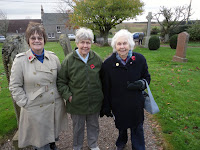 |
| Bishop Thornton: blue skies man |
Instead he got to: "... imagination is in, er, very great demand, is not around very much."
He was selling a notion that vicars (and congregations) could and should re-imagine roles and relationships. He cited leadership in churches in mixed lay/clerical teams.
You could say that sounds basically like a PCC working well, but that might be too simplistic.
However if we take seriously - and I think we should - the notion that imagination is in short supply then it might be helpful to look at some possible reasons.
I suggest, for starters:
- The episcopal system effectively leaves all initiative with the bishop. Tim Thorton can get people to work in different ways because he is bishop. When a new bishop arrives with different ideas they too will be followed by the clergy.
- Thornton says people need permission to be imaginative. Presumably because the episcopacy has previously constrained them.
- In effect Thornton says: by the authority vested in me I desire and permit you to be imaginative but (implicit but taught and heard well down the generations) only within the boundaries that I set. Those boundaries also include Thornton's tenure in office. New bishop, new ideas, new fashions and practices come into favour. However no bishop (nor, therefore incumbent) can bind the hands of their successor.
It's not that people lack imagination. It's that the structures and relationships of the CofE have taught both clergy and laity that, first, each member should stay in their allotted place, second, that imagination comes close to insubordination and, third, that any exercise of the imagination is acceptable only within certain prescribed boundaries (which may or may not be set out clearly and in advance).
 |
| I found this image when I searched for 'PCC' |
There are also, I think, also deeper and religious reasons for unimaginative practice.
- Faith is not only held (object-like) but lived, embodied. Insofar as faith is part of one's identity (individual or shared) behavioural change also entails becoming a different person, a different church. Of course, change is normal - it is the nature of life. But persuading someone else to deliberately change their identity, their sense of who they are and their relationships with others, is a very tall and often scary order.
- And there is always an anxiety in faith faced with novelty: how do we know we're getting it right? To do what has been done before is safe. It may not be adequate but it is secure. Part of embodied faith is the reassurance which comes from hallowed repetition.
It maybe that a disproportionate number of unimaginative people make their home in the CofE. or that the CofE has consistently devalued imagination. Or, probably, both. Either way it'll take more than episcopal encouragement to make a thousand flowers bloom.
 |
| Destination Imagination |
The last sustained and effective re-imagining of the CofE was by the Oxford Movement. It was, of course, initially opposed by bishops. It evoked opposition, some of it violent, sent some clergy to gaol, and took perhaps 100+ years to become the new normal. In part we need new imagination because we are only now shedding such victoriana.







